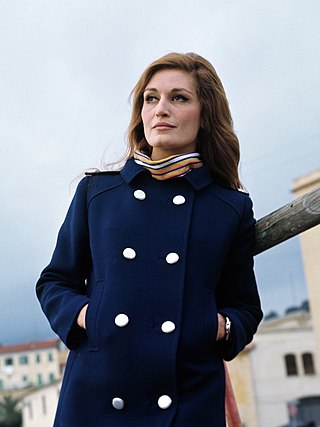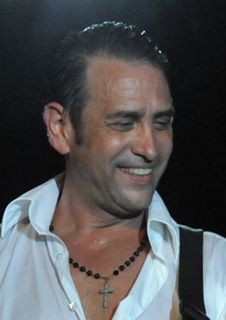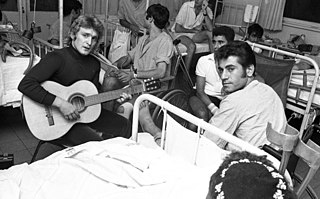
Iolanda Cristina Gigliotti, professionally known as Dalida, was a French singer and actress, born in Egypt to Italian parents. Leading an international career, Dalida has sold over 170 million records worldwide. Her best known songs are "Bambino", "Gondolier", "Les enfants du Pirée", "Le temps des fleurs", "Darla dirladada", "J'attendrai", "Le jour où la pluie viendra", "Gigi l'amoroso", "Salama ya salama", and "Paroles, paroles" featuring spoken word by Alain Delon.

Gaston Ghrenassia , known by his stage name Enrico Macias, is a French singer, songwriter and musician of Algerian Jewish descent.

"Paroles, paroles" is a song by French singer Dalida featuring French actor Alain Delon. It was released on 17 January 1973 as the lead single from her upcoming album Julien (1973). Lyrics describe the conversation of a man offering a woman caramels, bonbons et chocolat followed with shower of compliments, to what she says they mean nothing to her because they are just paroles – empty words. The song achieved big success in France and internationally, especially in Japan and Mexico, becoming one of the most recognizable French songs of all time. The first video clip was released in 2019, over 46 years after the songs's release.

Gigi in Paradisco is a bilingual French and English-language album released in 1980 by Italian and French singer Dalida. Two singles were released, both of which received gold certifications.

Olympia 81 is a French-language album released in 1981 by French singer Dalida. The album was highly successful and received a gold certification.

Le visage de l'amour is the last album Dalida released a year before her death. It was also her first album to be made as a CD format. The name "Le visage de l'amour" is usually used by Dalida to describe her public and her fans, it was picked up by the big French artist Charles Trenet who decided to write a song for Dalida bearing this name. It eventually became the name of her last album.
"Fascination" is a popular waltz song with music (1904) by Fermo Dante Marchetti and lyrics (1905) by Maurice de Féraudy.

The Best of Celine Dion is the third French-language compilation album by Canadian singer Celine Dion, released by Carrere Records in selected European countries on 2 May 1988, preceded by the Eurovision-winning song, "Ne partez pas sans moi". In Germany, the album was issued with a different cover and was titled Vivre.

"Le temps des fleurs" is a song by French singer Dalida for her twenty-first studio album of the same name. While the French lyrics were written by Eddy Marnay, the melody was taken from Russian romance song "Dorogoi dlinnoyu", composed by Boris Fomin in 1924. Dalida covered the song after Mary Hopkin had a hit with her English version "Those Were the Days" one month earlier.

Tant qu'il y aura des hommes is a reissue of French singer Amanda Lear's studio album Uomini più uomini. The album was released in 1989 by Carrere Records.

Véronique Jannot is a French actress and singer. She was born in Annecy, Haute-Savoie.
Frédéric François, is a French-speaking singer-composer living in Belgium.

François Valéry is a French singer-songwriter and composer.

Claude Dhotel, better known by his stage name C. Jérôme, was a French singer.

Yvon Éthier better known as Patrick Norman is a Canadian country musician. He sings both in French and English and has had hits in Quebec and in the rest of Canada.
Patti Layne is a Canadian singer/songwriter/recording artist. Patti Layne had a recording career in France from 1982–1991 and started recording again in 2009. Her first release in 1982, 'Une espèce de Canadienne' (Pathé/Campagne/Pathé-Marconi) written by Didier Barbelivien for her, was a moderate success. It was followed by an album. Several singles followed over the next few years.

Les Surfs were a Yé-yé-style pop group from Madagascar, that existed from 1963 until 1971.

Jean-Sébastien Abaldonato better known as Sébastien El Chato is a French singer and guitar player of Romani origin. He is based in Paris and has had a long string of albums since 1976.

Daniel Bevilacqua, better known by the stage name Christophe, was a French singer and songwriter. He was born in the Paris suburb of Juvisy-sur-Orge, to an Italian father.
















